小学英语阅读计划
小学小学生英语学习计划5篇
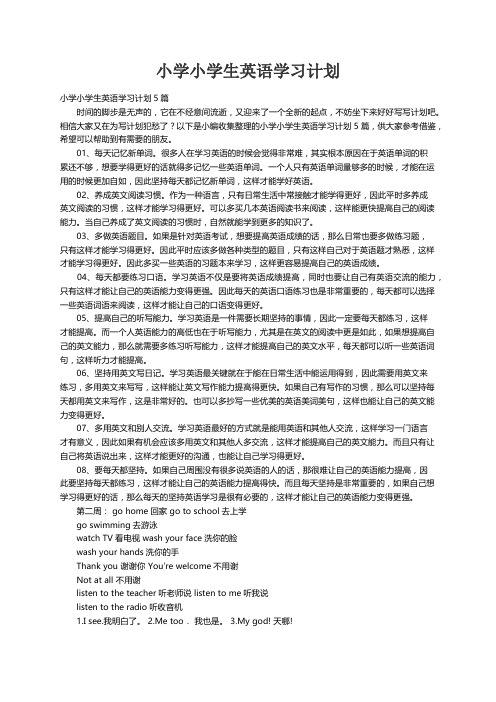
小学小学生英语学习计划小学小学生英语学习计划5篇时间的脚步是无声的,它在不经意间流逝,又迎来了一个全新的起点,不妨坐下来好好写写计划吧。
相信大家又在为写计划犯愁了?以下是小编收集整理的小学小学生英语学习计划5篇,供大家参考借鉴,希望可以帮助到有需要的朋友。
01、每天记忆新单词。
很多人在学习英语的时候会觉得非常难,其实根本原因在于英语单词的积累还不够,想要学得更好的话就得多记忆一些英语单词。
一个人只有英语单词量够多的时候,才能在运用的时候更加自如,因此坚持每天都记忆新单词,这样才能学好英语。
02、养成英文阅读习惯。
作为一种语言,只有日常生活中常接触才能学得更好,因此平时多养成英文阅读的习惯,这样才能学习得更好。
可以多买几本英语阅读书来阅读,这样能更快提高自己的阅读能力。
当自己养成了英文阅读的习惯时,自然就能学到更多的知识了。
03、多做英语题目。
如果是针对英语考试,想要提高英语成绩的话,那么日常也要多做练习题,只有这样才能学习得更好。
因此平时应该多做各种类型的题目,只有这样自己对于英语题才熟悉,这样才能学习得更好。
因此多买一些英语的习题本来学习,这样更容易提高自己的英语成绩。
04、每天都要练习口语。
学习英语不仅是要将英语成绩提高,同时也要让自己有英语交流的能力,只有这样才能让自己的英语能力变得更强。
因此每天的英语口语练习也是非常重要的,每天都可以选择一些英语词语来阅读,这样才能让自己的口语变得更好。
05、提高自己的听写能力。
学习英语是一件需要长期坚持的事情,因此一定要每天都练习,这样才能提高。
而一个人英语能力的高低也在于听写能力,尤其是在英文的阅读中更是如此,如果想提高自己的英文能力,那么就需要多练习听写能力,这样才能提高自己的英文水平,每天都可以听一些英语词句,这样听力才能提高。
06、坚持用英文写日记。
学习英语最关键就在于能在日常生活中能运用得到,因此需要用英文来练习,多用英文来写写,这样能让英文写作能力提高得更快。
小学英语绘本阅读社团课时计划
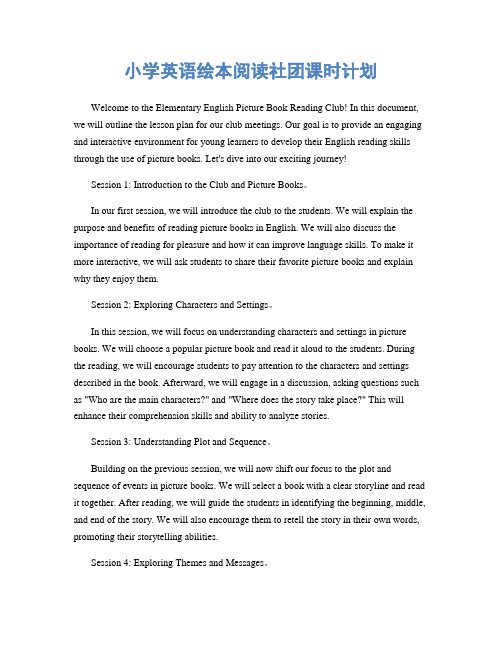
小学英语绘本阅读社团课时计划Welcome to the Elementary English Picture Book Reading Club! In this document, we will outline the lesson plan for our club meetings. Our goal is to provide an engaging and interactive environment for young learners to develop their English reading skills through the use of picture books. Let's dive into our exciting journey!Session 1: Introduction to the Club and Picture Books。
In our first session, we will introduce the club to the students. We will explain the purpose and benefits of reading picture books in English. We will also discuss the importance of reading for pleasure and how it can improve language skills. To make it more interactive, we will ask students to share their favorite picture books and explain why they enjoy them.Session 2: Exploring Characters and Settings。
In this session, we will focus on understanding characters and settings in picture books. We will choose a popular picture book and read it aloud to the students. During the reading, we will encourage students to pay attention to the characters and settings described in the book. Afterward, we will engage in a discussion, asking questions such as "Who are the main characters?" and "Where does the story take place?" This will enhance their comprehension skills and ability to analyze stories.Session 3: Understanding Plot and Sequence。
小学二年级英语学习计划范文(最新)

小学二年级英语学习计划范文篇一一、学习目标从听说读写四个方面全面,同时提高英语水平,最终使自己具备与人顺畅交流的能力,听懂新闻广播,演讲,报告,英文电影的能力,翻译以及写作的能力。
二、总则1、充分利用一切可以利用的时间学英语,把零碎的时间充分利用起来,不断地重复。
2、听说读写译五项都要练,以听说为主。
3、求质不求量,把听写的文章彻底搞懂足矣,不要好大喜功,贪大贪快。
扎扎实实,按部就班。
4、抓住一套教材足矣,不要盲目的更换教材5、每一天的计划,必须坚决执行,没有任何借口。
小学二年级英语学习计划范文篇二学习,用一句话概括就是“学而时习之”,练习的过程要善于思考和发现,教并不是灌输,也不是约束。
教,言传身教,更在于学习,教的过程离开了学,教了孩子也记不住,学的过程如果离开了教,就会漫无目的,容易失去方向。
课后借助于电子复习平台,读物和点读等学习手法,让孩子对学习英语爱不释手,也不断激发孩子爱思考,爱表现的兴趣。
总是想找家长去分享,也是在加强训练的时候,如果家长给予孩子适当的鼓励,支持,并加以引导和启发,让孩子能获得更多的收获,意外惊喜。
凡事不要三分钟热度,学习过程是持之以恒,循序渐进的,所以关注孩子学习就像吃饭一样,不能三天打鱼两天晒网,想起来关注一下,想不起来就不管了,只去让孩子自己复习,会逐渐降低孩子对学习的兴趣,精力和兴趣是一定的,厚此薄彼,及时疏导和鼓励,辅助孩子去解决问题。
比如亲子游戏,让家长和孩子一起面对生活,环境中的疑惑,困难,模拟场景,训练孩子的实践能力,同时也可以增加兴趣和亲子感情。
很多时候,实践才会出真挚,而实践也能出真情。
口头表达模仿的再多,还不如孩子尝试去表达一次。
小学二年级英语学习计划范文篇三一、主要目标每天保证一定的阅读量,一定的听力时间,至少15分钟的时间,集中注意力,并有意识的去记忆好的句子。
日常思考的时候,尝试用英语思考、想问题以培养语感。
争取获得优良成绩,能切实学到丰富的专业知识和基础常识。
小学四年级英语学习计划
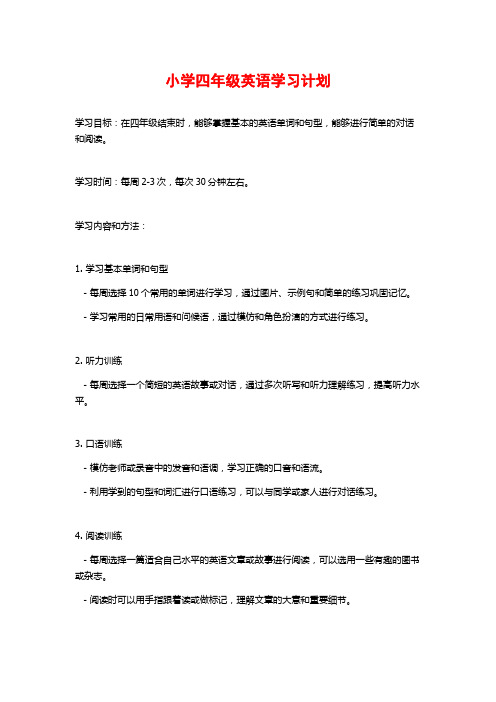
小学四年级英语学习计划
学习目标:在四年级结束时,能够掌握基本的英语单词和句型,能够进行简单的对话和阅读。
学习时间:每周2-3次,每次30分钟左右。
学习内容和方法:
1. 学习基本单词和句型
- 每周选择10个常用的单词进行学习,通过图片、示例句和简单的练习巩固记忆。
- 学习常用的日常用语和问候语,通过模仿和角色扮演的方式进行练习。
2. 听力训练
- 每周选择一个简短的英语故事或对话,通过多次听写和听力理解练习,提高听力水平。
3. 口语训练
- 模仿老师或录音中的发音和语调,学习正确的口音和语流。
- 利用学到的句型和词汇进行口语练习,可以与同学或家人进行对话练习。
4. 阅读训练
- 每周选择一篇适合自己水平的英语文章或故事进行阅读,可以选用一些有趣的图书或杂志。
- 阅读时可以用手指跟着读或做标记,理解文章的大意和重要细节。
5. 写作训练
- 每天练习写几个简单的句子,可以是自我介绍、描述动物、日常活动等。
- 根据自己的兴趣,写一些小短文或日记,记录学习的过程和生活的点滴。
6. 辅助资源
- 利用英语学习软件或网站,如Duolingo、BBC Learning English等,进行互动学习。
- 配备一本适合自己水平的英语学习书籍,例如Oxford Bookworms系列,进行阅读练习。
以上是一个简单的学习计划,可以根据实际情况进行调整。
希望能够帮助你更系统地
学习英语,提高英语水平。
2024年小学英语工作计划(四篇)
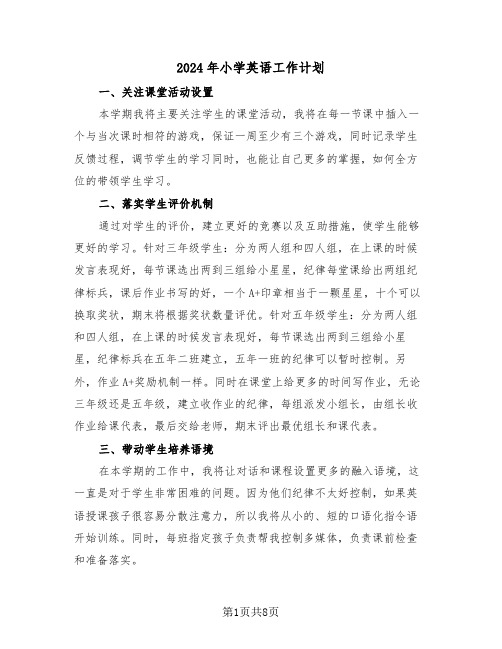
2024年小学英语工作计划一、关注课堂活动设置本学期我将主要关注学生的课堂活动,我将在每一节课中插入一个与当次课时相符的游戏,保证一周至少有三个游戏,同时记录学生反馈过程,调节学生的学习同时,也能让自己更多的掌握,如何全方位的带领学生学习。
二、落实学生评价机制通过对学生的评价,建立更好的竞赛以及互助措施,使学生能够更好的学习。
针对三年级学生:分为两人组和四人组,在上课的时候发言表现好,每节课选出两到三组给小星星,纪律每堂课给出两组纪律标兵,课后作业书写的好,一个A+印章相当于一颗星星,十个可以换取奖状,期末将根据奖状数量评优。
针对五年级学生:分为两人组和四人组,在上课的时候发言表现好,每节课选出两到三组给小星星,纪律标兵在五年二班建立,五年一班的纪律可以暂时控制。
另外,作业A+奖励机制一样。
同时在课堂上给更多的时间写作业,无论三年级还是五年级,建立收作业的纪律,每组派发小组长,由组长收作业给课代表,最后交给老师,期末评出最优组长和课代表。
三、带动学生培养语境在本学期的工作中,我将让对话和课程设置更多的融入语境,这一直是对于学生非常困难的问题。
因为他们纪律不太好控制,如果英语授课孩子很容易分散注意力,所以我将从小的、短的口语化指令语开始训练。
同时,每班指定孩子负责帮我控制多媒体,负责课前检查和准备落实。
四、着手学生落笔方式本学期的落笔主要集中在三年级上,我要花时间在纠正三年级的作业书写情况。
我决定建立小组长制度,以及互助制度,让学生互相监督,写好英语字母。
五、关注自身学习在上学期以及这学期的工作中,对我来说最有难度的是五年二班的纪律问题。
为此,我下决心,从理论知识做起,结合实践,本学期我将要完成《正面管教》和《教室里的正面管教》的脑图总结。
在期末的时候要写出我的实践对比感受。
六、建立健全图书馆管理办法远达书馆在校领导和同事的帮助下,如今已经逐渐走向了正轨。
在这个过程中,我非常感谢领导对我的帮助和指导,也很感谢很多班主任老师对我的支持,为我提供了很多学生帮忙,也感谢科任老师们,对我进行了工作方法的建议和身体力行的帮忙。
小学英语教师读书计划(5篇)

小学英语教师读书计划要给学生一杯水,自己要有一桶水,更要成为长流水。
只有读书,才能使自己成为源源不断的水。
本学期,我将继续利用晚上、双休日或节假日时间认真阅读自己所定的书目,在学习过程中记下自己的观点和看法,写出反思和随笔。
特别是记录自己点点滴滴的收获与体会。
此外,我还会将自己的读书所得运用到教育教学中来,丰富自身的文学底蕴,用读书来提升自身的理念,提高自己的教育教学水平。
让读书活动能够与课堂教学效果和相关教学活动相结合。
为此我为自己定下了以下的读书计划:一、我的读书目标:1、通过学习教育经典理论,转变教育观念,提高教育教学能力、教育创新能力,同时通过阅读接触更广的课外知识,深化更多的学科内容,逐步养成多读书,读好书的习惯。
2、通过阅读学习,树立正确的世界观、人生观、价值观和教师职业观,建立新型的师生关系,塑造良好的教师形象,通过阅读使自己业务精良,进一步提升教师的理念,开阔教师的视野,积累教学经验从而形成自己独特的教学风格。
3、通过阅读学习,丰富自身的人文涵养,强化自身修养,使自己的精神世界变得更为丰富多彩。
三、主要措施:1、个人自学为主,充分利用课余时间阅读有关书目,写好心得体会。
每天确保一小时的读书时间,让读书成为自己的自觉行动,学习成为自己的一种需要。
2、读书活动做到“六个结合”:读书与反思相结合,提倡带着问题读书,研究问题,解决问题;读书与实践相结合,学以致用,注重实效;读书与“校本教研-校本培训一体化”工作相结合,切实化解实践中的难题;个人阅读与集中学习相结合,广泛交流,相互启发,共同提高;读书与课改相结合,理解新课程,融入新课程,实施新课程;读书与不断解放思想相结合,提高认识,创新工作思路。
3、读书活动与课堂教学相结合。
要用现代教育思想指导教育教学工作实践,紧紧围绕学生发展和学生需求这个中心,为学生的发展提供开放的空间。
边学习教育理论,转变教育观念,及时认真地进行教学反思,真正做到“读”有所悟,“悟”有所用,“用”有所得。
六年级小学生英语学习计划(12篇)
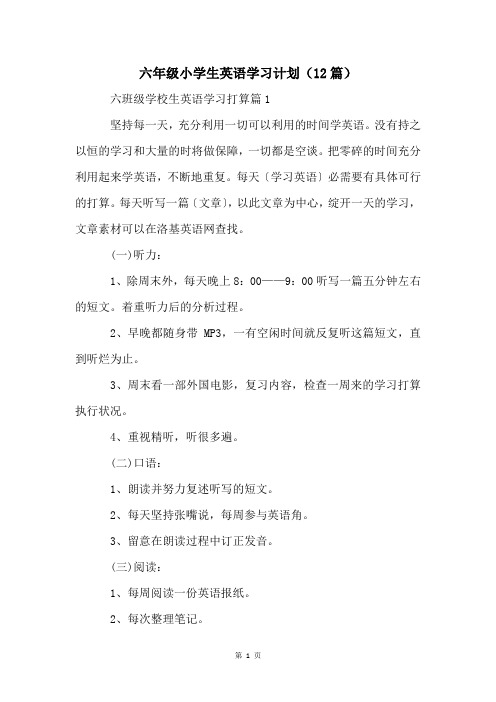
六年级小学生英语学习计划(12篇)六班级学校生英语学习打算篇1坚持每一天,充分利用一切可以利用的时间学英语。
没有持之以恒的学习和大量的时将做保障,一切都是空谈。
把零碎的时间充分利用起来学英语,不断地重复。
每天〔学习英语〕必需要有具体可行的打算。
每天听写一篇〔文章〕,以此文章为中心,绽开一天的学习,文章素材可以在洛基英语网查找。
(一)听力:1、除周末外,每天晚上8:00——9:00听写一篇五分钟左右的短文。
着重听力后的分析过程。
2、早晚都随身带MP3,一有空闲时间就反复听这篇短文,直到听烂为止。
3、周末看一部外国电影,复习内容,检查一周来的学习打算执行状况。
4、重视精听,听很多遍。
(二)口语:1、朗读并努力复述听写的短文。
2、每天坚持张嘴说,每周参与英语角。
3、留意在朗读过程中订正发音。
(三)阅读:1、每周阅读一份英语报纸。
2、每次整理笔记。
(四)写译:1、争取把每天听写的短文都翻译,先英汉,再汉英。
2、留意整理笔记。
这是一份学校英语学习打算,只有坚持练习才能真正学好英语六班级学校生英语学习打算篇2一般双休时在早上吃完早餐后读几个小时的英语 (必需吃完早餐哦)背诵A~B部分let`s read 和 let`s talk部分中午听听录音并跟着录音读下午(就是你放学的时候)写写单词自己墨一下并墨好、晚上记忆一下上午以及下午的内容多阅读,阅读的时候只看其中的意思,不要管每个词怎么发音;多听力,听的时候只听其中的意思,不要管每个词怎么拼写;多写作,写的时候要留意怎么把自己的意思表述出来,尽可能的多用好词;多口语,说的时候要留意怎么把自己的意思表述出来,发音要准。
六班级学校生英语学习打算篇3一、摸清学情,理清思路首先,对学习状况有清楚的熟悉。
可以通过对平常的单元练习测试分析进行一个汇总,从而弄清易错点,有针对性地进行复习,即要“避轻就重”,对把握较好的内容可以少花点时间,而说较难的则要想方法,通过讲解、练习、分析、〔总结〕等〔方法〕,把难点个个击破。
小学四年级英语计划表(精选5篇)
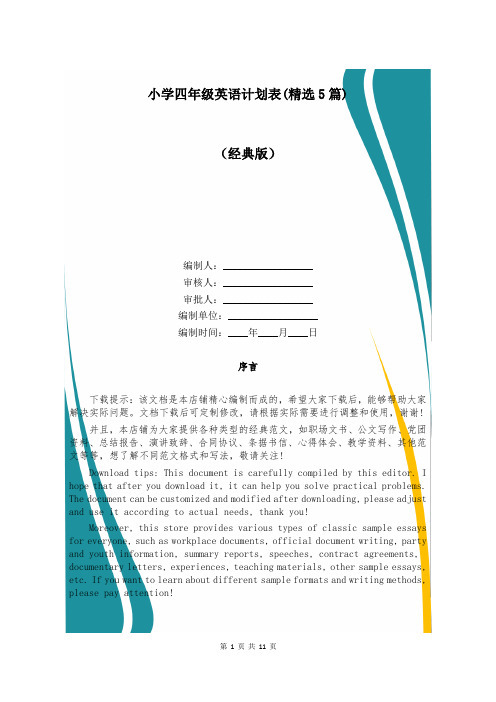
小学四年级英语计划表(精选5篇)(经典版)编制人:__________________审核人:__________________审批人:__________________编制单位:__________________编制时间:____年____月____日序言下载提示:该文档是本店铺精心编制而成的,希望大家下载后,能够帮助大家解决实际问题。
文档下载后可定制修改,请根据实际需要进行调整和使用,谢谢!并且,本店铺为大家提供各种类型的经典范文,如职场文书、公文写作、党团资料、总结报告、演讲致辞、合同协议、条据书信、心得体会、教学资料、其他范文等等,想了解不同范文格式和写法,敬请关注!Download tips: This document is carefully compiled by this editor. I hope that after you download it, it can help you solve practical problems. The document can be customized and modified after downloading, please adjust and use it according to actual needs, thank you!Moreover, this store provides various types of classic sample essays for everyone, such as workplace documents, official document writing, party and youth information, summary reports, speeches, contract agreements, documentary letters, experiences, teaching materials, other sample essays, etc. If you want to learn about different sample formats and writing methods, please pay attention!小学四年级英语计划表(精选5篇)时间就如同白驹过隙般的流逝,我们的工作与生活又进入新的阶段,为了今后更好的发展,写一份计划,为接下来的学习做准备吧!计划为我们提供了一个清晰的方向,帮助我们更好地组织和管理时间、资源和任务。
小学英语学习计划表

千里之行,始于足下。
学校英语学习方案表学校英语学习方案表为了提高学校生的英语水平,培育他们的英语学习爱好和力量,制定一份学校英语学习方案表格外必要。
以下是一份学校英语学习方案表,旨在挂念学校生系统地学习英语。
学习目标:1. 提高学校生的英语听说力量;2. 学习基本的英语词汇和语法;3. 增加英语阅读和写作的练习。
周一至周四:每天早晨练习:1. 听英语歌曲:每天早晨放一首简洁的英语歌曲,让学校生学习英语的语音和节奏。
每天下午练习:1. 基本词汇学习:每天学习5个基本的英语单词,例如:apple(苹果)、cat(猫)、dog(狗)、book(书)等。
学习新单词的拼写和发音,并加以复习。
周五:第1页/共2页锲而不舍,金石可镂。
1. 复习本周学习的词汇:通过玩耍、拼图或图片等形式来巩固本周学习的词汇。
周末:1. 阅读时间:每天读一篇简短的英语故事,并理解故事的简洁内容。
可以每周更换故事的主题,例如动物、家庭等。
同学也可以选择自己宠爱的英语故事来阅读。
2. 写作练习:每天写一篇简短的英语日记,描述自己的一天或周末的活动。
可以借助图片或拼图来挂念写作。
留意事项:1. 每天坚持听英语歌曲,让同学接触标准的英语发音和节奏;2. 词汇学习不仅仅要学习单词的拼写和发音,还要培育同学的词汇记忆力量;3. 阅读时间可以选择适合学校生程度的英语故事,激发他们对英语的爱好;4. 写作练习可以依据同学的程度适当调整难度,不要使同学感到压力太大。
学校英语学习方案表就是如上的内容,通过制定周一至周四和周末的学习方案,挂念学校生系统地学习英语,培育他们的英语听说力量、词汇记忆力量、阅读力量和写作力量。
同时,学习方案中的留意事项也能挂念老师和家长更好地指导学校生的英语学习。
小学英语读课标,读教参,读教材活动计划

小学英语读课标,读教参,读教材活动计划全文共3篇示例,供读者参考篇1Activity Plan: Reading the Curriculum Standard, Teaching Reference, and Teaching Materials for Elementary EnglishI. IntroductionReading is an essential skill for language learning, especially in English education. To help students improve their reading skills, it is crucial for teachers to carefully go through the curriculum standard, teaching reference, and teaching materials. Through this activity plan, teachers can create effective lessons that cater to students' needs and enhance their reading abilities.II. Objectives1. To familiarize teachers with the content of the curriculum standard, teaching reference, and teaching materials for elementary English.2. To help teachers understand how to integrate the curriculum standard, teaching reference, and teaching materials into their lesson planning.3. To provide teachers with practical strategies for teaching reading skills in the English classroom.III. Activities1. Reading the Curriculum Standard:- Take time to read through the curriculum standard for elementary English.- Identify the key language skills and learning objectives.- Discuss with colleagues or mentors to clarify any doubts or questions.- Reflect on how the curriculum standard can guide your teaching practice.2. Reading the Teaching Reference:- Review the teaching reference provided by the education department or school.- Pay attention to the suggested teaching strategies and activities.- Adapt the teaching reference to suit the needs and interests of your students.- Explore additional resources and materials that can complement the teaching reference.3. Reading the Teaching Materials:- Examine the teaching materials, including textbooks, workbooks, and supplementary materials.- Select relevant reading passages, exercises, and activities for your lessons.- Incorporate multimedia resources and technology to engage students in reading.- Develop creative and interactive tasks that promote reading comprehension and vocabulary acquisition.IV. Implementation1. Create a reading schedule based on the curriculum standard and teaching reference.2. Design lesson plans that align with the learning objectives and language skills outlined in the curriculum standard.3. Use a variety of teaching materials to support students' reading development.4. Provide opportunities for students to read independently, in pairs, and in groups.5. Monitor students' progress and provide feedback to support their reading growth.6. Encourage students to practice reading outside the classroom through homework assignments and extracurricular activities.V. Evaluation1. Reflect on the effectiveness of the activities in improving students' reading skills.2. Collect feedback from students, colleagues, and parents on the impact of the reading activities.3. Assess students' reading proficiency through quizzes, tests, and reading comprehension exercises.4. Adjust teaching strategies and materials based on the evaluation results to meet students' needs.VI. ConclusionReading the curriculum standard, teaching reference, and teaching materials is a vital step in creating engaging and effective English lessons for elementary students. By followingthis activity plan, teachers can enhance their teaching practice and help students develop their reading skills in a fun and interactive way.篇2Title: Activity Plan for Reading the English Curriculum, Teaching References and Textbooks in Primary SchoolIntroduction:Reading is an essential skill that every student must develop, especially in the study of English. In order to enhance students' reading abilities and improve their overall English proficiency, it is important for teachers to incorporate a variety of reading materials into their lessons. This activity plan is designed to help primary school students engage with the English curriculum, teaching references, and textbooks in a fun and interactive way.Objective:The main objective of this activity plan is to promote active reading among primary school students and enhance their understanding of the English language. By participating in a range of reading activities, students will not only develop their reading skills but also improve their vocabulary, comprehension, and critical thinking abilities.Activities:1. Reading Races: Divide the class into teams and give each team a passage from the English curriculum, teaching reference, or textbook. The teams must race against each other to see who can read and comprehend the passage the fastest. The team with the highest accuracy wins a prize.2. Reading Comprehension Quizzes: Create a series of multiple-choice or short-answer questions based on the English curriculum, teaching references, or textbooks. Have students work individually or in pairs to answer the questions. This activity will test their understanding of the material and encourage them to pay close attention to detail.3. Storytelling Sessions: Choose a story from the English curriculum, teaching reference, or textbook and have students take turns reading aloud to the class. Encourage students to use expression and intonation while reading to bring the story to life. Afterward, facilitate a discussion about the story and ask students to share their thoughts and opinions.4. Vocabulary Building Games: Introduce new vocabulary words from the English curriculum, teaching references, or textbooks and play games such as Bingo, Charades, or Pictionary to help students remember the words. This interactive approachwill make learning new words more engaging and memorable for students.5. Book Club Meetings: Create a book club for students to read and discuss selected books from the English curriculum, teaching references, or textbooks. Encourage students to share their favorite passages, characters, and themes from the book, and facilitate discussions about the literary elements of the text.Conclusion:By implementing these reading activities into the classroom, teachers can help students develop a love for reading, improve their English proficiency, and deepen their understanding of the English curriculum, teaching references, and textbooks. Through active engagement with reading materials, students will become more confident readers and thinkers, setting them up for academic success in the future.篇3Title: Activity Plan for Reading Course Standards, Teaching References, and Textbooks in Elementary EnglishIntroduction:Reading is a fundamental skill in language learning and plays a crucial role in a student's overall academic success. It is important for students to read widely and develop their reading comprehension skills from an early age. In this activity plan, we will focus on utilizing the English language course standards, teaching references, and textbooks for elementary students to design engaging and effective reading activities.Objective:The objective of this activity plan is to enhance students' reading skills, vocabulary acquisition, and overall English language proficiency through interactive and fun activities based on the course standards, teaching references, and textbooks.Activity Plan:1. Course Standards Analysis:- Review the English language course standards for elementary students to identify the key reading skills and competencies that need to be developed.- Create a checklist or rubric based on the course standards to assess students' reading progress throughout the activities.2. Teaching References Exploration:- Explore various teaching references such as online resources, recommended reading materials, and educational websites to supplement the textbook readings.- Select relevant teaching references that align with the course standards and cater to the students' interests and reading levels.3. Textbook Utilization:- Choose specific reading passages or exercises from the English language textbooks that cover a range of topics and reading genres.- Design comprehension questions, vocabulary activities, and discussion prompts based on the textbook readings to enhance students' understanding and engagement.4. Reading Activities:- Organize a reading circle where students take turns reading aloud from the textbook passages and discuss their interpretations and opinions.- Create vocabulary flashcards or word games based on the key terms and phrases from the textbook readings to reinforce students' vocabulary retention.- Conduct reading comprehension exercises such as multiple-choice questions, true/false statements, and short answer responses to assess students' comprehension skills.- Integrate multimedia resources such as videos, audio recordings, and interactive websites to enhance the reading experience and provide a multi-sensory learning approach.5. Assessment Strategies:- Use the checklist or rubric based on the course standards to assess students' reading skills, vocabulary acquisition, and comprehension abilities.- Provide constructive feedback and individualized support to help students improve their reading performance and achieve their learning goals.- Encourage students to track their reading progress and set personal reading targets to enhance their motivation andself-regulation.Conclusion:By implementing this activity plan for reading course standards, teaching references, and textbooks in elementary English, educators can create a dynamic and engaging learning environment that fosters students' reading skills and overalllanguage proficiency. Through interactive activities, targeted assessments, and personalized support, students can develop a lifelong love for reading and excel in their English language learning journey.。
周计划小学英语阅读强化训练一二年级内容
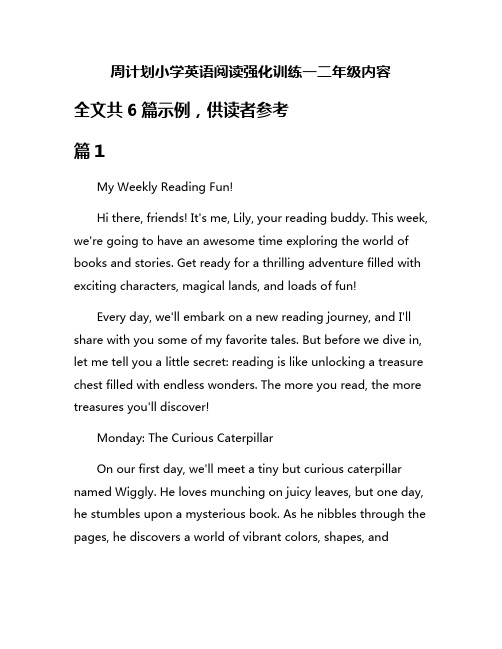
周计划小学英语阅读强化训练一二年级内容全文共6篇示例,供读者参考篇1My Weekly Reading Fun!Hi there, friends! It's me, Lily, your reading buddy. This week, we're going to have an awesome time exploring the world of books and stories. Get ready for a thrilling adventure filled with exciting characters, magical lands, and loads of fun!Every day, we'll embark on a new reading journey, and I'll share with you some of my favorite tales. But before we dive in, let me tell you a little secret: reading is like unlocking a treasure chest filled with endless wonders. The more you read, the more treasures you'll discover!Monday: The Curious CaterpillarOn our first day, we'll meet a tiny but curious caterpillar named Wiggly. He loves munching on juicy leaves, but one day, he stumbles upon a mysterious book. As he nibbles through the pages, he discovers a world of vibrant colors, shapes, andnumbers! Join Wiggly as he embarks on a delightful journey of learning and self-discovery.Tuesday: The Magical TreehouseImagine a treehouse that can transport you to any place or time you desire! That's exactly what happens to best friends Jack and Jill. Together, they'll explore ancient civilizations, meet famous historical figures, and learn about fascinating cultures from around the world. Get ready to experience the ultimate time-traveling adventure!Wednesday: The Friendly ForestDeep in the heart of the forest lives a charming community of animals. From the wise old owl to the mischievous squirrels, each creature has a unique story to tell. As we follow their daily adventures, we'll learn valuable lessons about friendship, kindness, and respecting nature.Thursday: The Superhero AcademyHave you ever dreamed of having superpowers? Well, at the Superhero Academy, anything is possible! Join our group of young heroes-in-training as they learn to harness their incredible abilities while facing exciting challenges and daring missions. Get ready to save the day with your new superhero friends!Friday: The Cooking KingdomIn the delightful Cooking Kingdom, every dish is a delicious adventure. Meet Chef Zesty and her team of culinary masters as they whip up mouth-watering treats from around the globe. Along the way, you'll discover interesting facts about different cultures, their favorite foods, and maybe even learn a recipe or two!Throughout our weekly reading adventures, we'll encounter new words, explore different genres, and practice our comprehension skills. But don't worry; it's all going to be super fun! We'll play exciting games, solve puzzles, and even create our own stories together.Remember, reading is a magical journey, and the more you practice, the better you'll become. So, let's put on our adventurer's hats, grab our trusty books, and get ready to explore the wondrous world of reading!Who's excited? I know I am! See you on our first reading adventure tomorrow, friends!篇2My Awesome Week Ahead!Hi there! My name is Emily and I'm so excited to tell you all about the super fun week I have planned. Every week, my mom helps me make a schedule of activities and things to look forward to. This week is going to be the best yet!On Monday after school, I have my ballet class. I've been taking ballet for two years now and I just love it. My favourite part is when we get to dance across the floor and learn new moves. I'm working really hard to perfect my arabesque! After ballet, I'll come home and mom will help me with my math homework. I find adding and subtracting a little tricky sometimes, but mom is a great teacher. Once my homework is done, we'll have dinner and then I can play outside until bedtime. Hopefully the weather is nice!Tuesday is a busy day for me. First thing in the morning, I have swimming lessons bright and early at 8am. I've gotten really good at floating on my back and blowing bubbles underwater. My instructor says I'm making great progress! After swimming, it's off to school. In the afternoon, I have my weekly piano lesson. I'm learning how to read music and play simple songs. My piano teacher says if I keep practicing every day, I'll be a piano master in no time!Wednesday is probably my favourite day of the week. Why? Because it's art class day at school! We get to do all sorts of creative projects like painting, drawing, sculpting with clay...you name it! I can't wait to see what we'll be making this week. Maybe we'll paint self portraits or make greeting cards for Mother's Day coming up. Art is just the best.Thursday I don't have any after-school activities, so I'll head home and spend some quality time with my baby brother Jacob. He's just learned how to crawl, so it's really fun chasing him around and playing peekaboo. I love being a big sister! Later that night, the whole family will gather for movie night. We'll make popcorn, build a cozy pillow fort, and watch a fun family film all cuddled up together. Movie nights are the greatest.Finally, Friday is here! That means it's time for my favourite day of the whole week...Saturday! Just kidding, Fridays are pretty awesome too. At school, we'll have show and tell and I get to bring in my favourite stuffed animal to share with the class. His name is Mr. Fuzzykins and he's a puppy that's been my best friend since I was a baby. After school, I have soccer practice. I play on a local kids' team and we're getting ready for our big tournament next month. I'll run lots of drills and do exercises to get super strong so I can score ALL the goals!Once the weekend rolls around, there's even more fun on the agenda. On Saturday morning, my family is going strawberry picking at a farm just outside of town. I can't wait to fill up my basket and then bake a delicious strawberry pie with mom when we get home. Yum! That afternoon, my cousins are coming over and we're going to have an epic pillow fight in the backyard. Then it's a sleepover complete with ghost stories, truth or dare, and makeovers!Phew, I'm getting tired just thinking about this awesome week ahead! I'll be sure to get plenty of sleep so I have energy for all the activities. Sunday will be my relax and recharge day before the new week starts again.Well, that's my full week planned out. Between ballet, swimming, piano, art, family time, sports, and more...it's shaping up to be an absolute blast! I feel so lucky to have such a fun life with all my favourite hobbies packed in. I can't wait to tell you guys all about how it went when I see you again next week. Stay tuned for more adventures!篇3My Weekly Reading PracticeHi there! My name is Emily and I'm a 2nd grader. This week, my teacher Mrs. Johnson gave us a fun reading assignment to practice our skills. She said reading is really important and the more we practice, the better we'll get. I'm excited to work on it!On Monday, we read a story about a puppy who got lost in the park. It was looking for its owner and had to go on a big adventure to find its way home. I felt really bad for the poor puppy! The story used lots of words I didn't know, like "frantically" and "scampered." Mrs. Johnson helped me learn what those new words meant. By the end of the story, I was so happy when the puppy finally found its owner again!Tuesday's reading was all about different kinds of fruits. I learned that fruits like apples and oranges are sometimes called "pomes" or "citrus fruits." There were so many interesting facts, like how strawberries aren't actually berries at all! They're get this - accessory fruits. Wild, right? My favorite part was looking at all the colorful pictures of exotic fruits I've never tried before. Maybe my mom will let me taste a star fruit or rambutan sometime!On Wednesday, we read a passage about how rain happens.I already knew a little about the water cycle from our science lessons. But this talked about condensation, precipitation, andother new vocabulary words. It explained how clouds form and why they get so heavy with water that it finally rains down. I'll definitely remember those details the next time I hear thunder and see lightning during a storm!Yesterday was my favorite reading of the week - a story all about a young magician named Zara. She finds a magic wand at an old antique store and starts learning how to do cool tricks like making things disappear or float through the air! The story was filled with funny, imaginary details about Zara's silly mistakes as she practiced her spells. I enjoyed picturing her rabbit assistant Benny helping out, even though Zara would sometimes accidentally turn him into a bird or a frog instead! Whoops. I can't wait to hear what other wacky adventures Zara the magician goes on next.Today is Friday, the last day of our reading practice week. The topic is planets and outer space. So far, I've learned the names of all 8 planets in our solar system, which ones have rings around them, and which is the biggest or smallest. There's also info about galaxies, asteroids, and astronauts who have traveled to the Moon. Outer space seems so vast and mysterious! I'm definitely more interested in studying the planets and stars after this passage.Reading comprehension is hard work sometimes, but this week's assignments have shown me how fun it can be, too. I've learned so many new words and facts about different subjects. My mind feels like an outer space black hole - just sucking up all that knowledge! Mrs. Johnson always says reading opens up whole new worlds for our imaginations. I'm already excited for whatever reading adventures come next week. Keep on reading, friends!篇4My Weekly Reading PlanHi there! My name is Emma and I'm 7 years old. I love reading all kinds of books and stories. This week my teacher gave us a fun reading plan to follow. I'm really excited to work on it! Let me tell you all about it.On Monday, we have to read a short story about a friendly dog named Buddy. I adore stories with animal characters! Buddy goes on all sorts of adventures in his neighborhood. In this story, he tries to help a lost kitten find its way back home. I can't wait to see if Buddy reunites the kitten with its owners. My teacher said after reading it, we have to draw our favorite part of the story. I'm going to draw Buddy sniffing to find the kitten's scent trail.Tuesday is poetry day! We get to read some simple but silly poems about different foods. One is called "The Crunchy Carrot" and another is "The Jiggly Jell-O." Poetry uses lots of great descriptive words to paint pictures in our minds. After reading them, we have to circle all the words that describe how the foods look, feel, smell, or taste. Words like "crispy," "gooey," and "tangy" will probably be in there. Yum!On Wednesday, we're switching gears to a non-fiction book. It's all about life on a farm! We'll learn what crops grow on a farm, like corn, wheat, and pumpkins. We'll also read about common farm animals like cows, pigs, and chickens. There are supposed to be lots of colorful pictures and diagrams too. When we finish the book, we have to draw our own picture of a farm and label the different parts. I'm picturing a big red barn, a tractor, and lots of animals roaming around!Thursday will be super cool because we get to read a play! It's a short and funny play about a magic pencil that can draw anything. Whenever someone uses this special pencil, their doodles come to life and cause mischief. We'll get to pick roles and read the different character parts out loud in groups. I hope I get to play the talkative pencil! Our assignment after is to write our own scene where the magic pencil draws something crazy.Finally, on Friday we'll read a beautifully illustrated storybook about the seasons. It describes how things change during spring, summer, fall, and winter. We'll learn why leaves change color, why some animals hibernate, and more seasonal facts. For this book, our task is to make a picture schedule. We have to draw symbols representing the books and assignments we did each day of the week. Sort of like a fun summary of our whole reading plan!I'm really looking forward to all the different reading we'll do this week. Reading time is my favorite part of every school day. Getting lost in a good story or learning new facts makes me feel like I'm on a grand adventure. And working on related activities and projects makes it even more enjoyable. I'll have tons of book experiences to share with my parents and friends by next weekend. Reading is the best!篇5Weekly Reading Practice for Elementary English (Grades 1-2)Hi there! My name is Alex, and I'm a second-grader at Sunnyville Elementary School. I love reading and learning new things, especially in English class. This week, our teacher, Mrs.Clark, gave us some exciting reading activities to practice our skills. Let me share with you what we did!On Monday, we started with a fun story called "The Hungry Caterpillar." It was about a caterpillar who ate his way through all kinds of delicious foods before turning into a beautiful butterfly. Mrs. Clark read the story aloud, and we followed along in our books. The pictures were so colorful and engaging! After reading, we talked about the different foods the caterpillar ate and learned some new vocabulary words like "nibble" and "cocoon."Tuesday was all about rhyming words. We played a game where Mrs. Clark would say a word, and we had to come up with as many rhyming words as possible. It was like a silly competition to see who could find the most rhymes! My favorite was when she said "cat," and I shouted, "bat, hat, mat, sat, and rat!" We also read a book filled with silly rhymes and tongue twisters, which made us all giggle uncontrollably.On Wednesday, we focused on reading comprehension. Mrs. Clark gave us a short story about a girl named Emma and her adventures at the park. After reading it quietly to ourselves, we answered some questions about the characters, setting, and main events. I had to go back and reread a few parts to find the answers, but it helped me practice my comprehension skills.Thursday was all about sight words – those common words that we need to recognize instantly without sounding them out. We played a game where Mrs. Clark would flash a word on the board, and we had to read it out loud as quickly as possible. We also did some word searches and scrambled word puzzles to reinforce these essential words.Finally, on Friday, we got to choose our own books from the classroom library and read them silently or with a partner. I picked a book about dinosaurs, which is one of my favorite topics. After reading, we had to draw a picture or write a few sentences about our favorite part of the book. I drew afierce-looking T-Rex and wrote about how it was one of the largest carnivores that ever lived!Overall, it was a fun and educational week of reading activities. I feel like I improved my vocabulary, rhyming skills, comprehension, and sight word recognition. Reading is such an essential skill, and I'm glad we get to practice it in so many engaging ways at school. I can't wait to see what next week's reading adventures will bring!篇6My Weekly Reading Fun!Hi everyone! My name is Amy and I'm 7 years old. I love to read all kinds of books and stories. Reading is so much fun and I learn new things every time! This week, my teacher gave us some really cool reading assignments. I'm excited to share them with you.On Monday, we read a story called "The Three Little Pigs". It's about three little pigs who each build their own house. The first pig builds a house of straw, but the Big Bad Wolf blows it down! The second pig builds a house of sticks, but the wolf blows that down too. Finally, the third little pig builds a house of bricks that the wolf can't blow down. I felt bad for the first two pigs, but I was so happy the third pig was safe in his sturdy brick house. After we read the story, we had to circle all the words that rhymed like "straw" and "saw". Rhyming is super fun!Tuesday's story was called "The Little Red Hen". It's about a hard-working hen who finds some wheat seeds. She asks her friends the cat, dog, and mouse to help her plant and harvest the seeds, but they all say "Not I!". So the little red hen does all the work herself. But when she bakes a delicious loaf of bread from the wheat, her friends want to eat it! The hen tells them no since they didn't help. I thought that was fair. My favorite part was when the hen asked "Who will help me bake the bread?" I likepretending to be that character. After reading, we had to put sentences from the story in the right order.On Wednesday, we read a book of silly poems and tongue twisters. Tongue twisters are super hard to say! Like "She sells sea shells by the sea shore" - try saying that three times fast! My favorite poem was about a purple penguin who loved to paint pictures. The rhymes and made-up words made me giggle. For our assignment, we had to find all the words that started with "P" and words that rhymed with "paint". I circled so many words, my page looked like a colorful circle sketch!Thursday's book was non-fiction, which means it's full of true facts and information. We learned all about amazing animals like elephants, lions, and dolphins. Did you know elephants are the largest land animals and their trunks are actually a super long nose? So cool! We saw pictures of elephant herds migrating across the hot African savanna. For our work, we had to write down three new facts we learned about each animal. I can't wait to tell my parents all the elephant info!Finally on Friday, we got to pick any book we wanted from the classroom library and do a fun project. I chose a book about astronauts exploring space. I made a little model rocket ship out of popsicle sticks, paper, and aluminum foil. I even drew planets,stars, and aliens on the background! Reading really lets your imagination blast off. Maybe I'll be an astronaut scientist when I grow up.Overall, this was an awesome week of reading adventures. Stories, poems, facts - I loved it all! Reading exercises our brains and takes us anywhere we want to go. I'm already looking forward to next week's books and assignments. The more I read, the more words I learn, and the better reader I'll become. Keep on reading, boys and girls! Let's go on more excellent reading journeys together.。
周计划小学英语阅读强化训练四年级
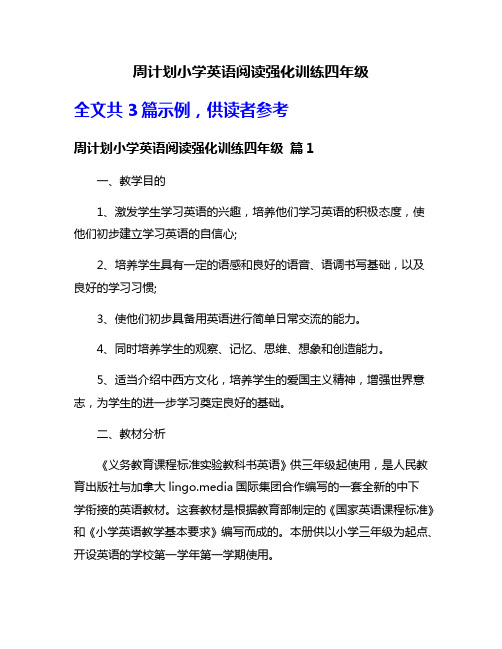
周计划小学英语阅读强化训练四年级全文共3篇示例,供读者参考周计划小学英语阅读强化训练四年级篇1一、教学目的1、激发学生学习英语的兴趣,培养他们学习英语的积极态度,使他们初步建立学习英语的自信心;2、培养学生具有一定的语感和良好的语音、语调书写基础,以及良好的学习习惯;3、使他们初步具备用英语进行简单日常交流的能力。
4、同时培养学生的观察、记忆、思维、想象和创造能力。
5、适当介绍中西方文化,培养学生的爱国主义精神,增强世界意志,为学生的进一步学习奠定良好的基础。
二、教材分析《义务教育课程标准实验教科书英语》供三年级起使用,是人民教育出版社与加拿大lingo.media国际集团合作编写的一套全新的中下学衔接的英语教材。
这套教材是根据教育部制定的《国家英语课程标准》和《小学英语教学基本要求》编写而成的。
本册供以小学三年级为起点、开设英语的学校第一学年第一学期使用。
《义务教育课程标准实验教科书英语》的设计和编写体现了外语教学思想的继承和发展。
在分析、研究许多种国内外小学英语教材的基础上,取其精华,博采众长,形成了本套教材特有的编写体系。
同时,有吸收了当今国内外英语作为外语教学的理论和成功经验,把这些教学理论和实践经验同我国的小学外语教学实际相结合,以形成我国小学英语的外语教学模式和教学方法。
本册教材具有以下几个特点:1、注重学生语言运用能力的培养,突出语言的实践性和交际性,同时也突出语言的真实性和实用性。
2、注重学生自学能力和学习策略的培养,为学生的进一步学习或终身学习奠定基础。
3、注重中外文化的双向交流,使学生通过学习,培养未来跨文化交际所需要的能力。
4、注重学生学习兴趣的培养,以不同方式最大限度的激发学生的学习动机。
5、注重融合学科内容,加强学科之间的整合和渗透,让学生通过英语学习来获得其他学科的知识。
6、注重教材的灵活性和可操作性,以满足不同层次的学生的需求。
7、注重教学资料的配套,为学生提供良好的英语学习环境,帮助学生拓展自我发展的空间。
“构”画小学英语阅读的蓝图——培养英语学科核心素养的小学文本重构阅读策略

基础教育参考·2018/03新课程改革对英语阅读教学提出了新的要求,要使阅读教学成为学生、教师和文本之间的对话过程。
这也说明,文本与阅读教学同样重要。
其实,英语的核心素养都可以体现在文本阅读中。
王蔷教授在《中国中小学生英语分级阅读标准》一书中指出:中小学生外语阅读素养包括“外语阅读能力”和“外语阅读品格”两个维度[1],二者不能脱离文本而作为一个学术概念单独存在。
可见,没有了文本,阅读就失去了依托。
因此,英语阅读教学的过程,应该就是文本解读与重构的过程。
在教学中,文本指的是突显语境、语用目的、语义功能和交流目的的教学材料,比如课文。
而文本重构就是把教材内容进行重新组合和建构,这种建构是基于教材,又结合所教对象已有的知识和经验,把所教授的内容进行再处理整合的一个重构的过程,使之形成一个具有情境和可操作性的可观、可读、可感的文本语段[2]。
它是一种教学理念,也是一种教学策略。
文本重构要建立在一定的语境基础上,结合具体的主题内容,最终要达到激发学生学习兴趣、调动学生语用激情、提高学生学习有效性的目标。
下面以广州教科版小学英语教材为例,探讨文本重构阅读策略。
“构”画小学英语阅读的蓝图———培养英语学科核心素养的小学文本重构阅读策略董振颐,广东省广州市越秀区东山实验小学副教导主任,小学英语高级教师,广州市“百千万人才培养工程”第二批名教师培养对象,广州市越秀区英语专题研究组成员。
先后被评为全国教育发展“十五”计划重点课题科研项目“信息化资源的开发与利用”研究工作的先进实验工作者、广州市第13届特约教研员、东山区第五届“东教新星”、东山区优秀教师、越秀区优秀教师。
现为广州市第二批中小学市级骨干教师,广州市第三批中小学英语学科骨干教师实践导师。
曾多次承担市级、区级公开课,在各级教育类期刊发表多篇论文,并有多项课题成果或论文获国家、省、市、区级奖励。
殷董振颐作者简介:董振颐,广东省广州市越秀区东山实验小学高级教师,E-mail :191176975@ (广东广州,315300)[摘要]国内中小学教材的容量有限和阅读材料不足的问题使英语阅读教学难以真正展开。
小学生英语学习计划(通用10篇)

小学生英语学习计划(通用10篇)小学生英语学习计划 1一、以兴趣为契机,多结合生活实际,学会运用语言初学英语阶段,意识还处于感性阶段,老师会千方百计地在课堂上激发培养小学生的学习兴趣,如通过做游戏、唱儿歌、画图画等小学生喜闻乐见的形式来调动学习热情和积极性,让小学生明白学习英语是件很有趣的事情。
二、注意良好学习习惯的养成1、倾听的习惯。
2、养成规范书写的习惯。
3、养成正确记忆单词的习惯。
三、注重积累,搜寻有效的记忆方法。
记忆在英语学习中占有重要地位,记忆方法直接关系到英语学习的'成败。
小学生是初学者对于单词的记忆还知识处于感性阶段,如能引导得当,能发挥他们记忆的潜能。
很多人说在阅读中背单词,但那是需要一定的单词量作为基础才行。
虽然阅读很重要,但集中精力专门背单词还是必须的,否则单词量太少,阅读就完全失去了兴趣。
我们学习我们的母语,尚需要专门的记生词和生字。
可以使用单词记忆方法记忆,笔者曾体验过“表音密码”这个方法。
这个方法的好处就是记忆的效果特别好,它的原理具体我也说不清楚,一开始用觉得这方法挺一般的,没什么特别的,但是体验完到后来(你试个几天),你就会发现很神奇了,它真的能让你做到见词能读、听词能写。
并且从此大量的单词不再是问题。
这对于大量词汇记忆来说是非常关键的。
四、持之以恒,把握未来。
学习英语要过许多关,如语音关、开口关、拼读关、朗读关、默读关、快读关、词汇记忆关、句型转换关、情景说话关、快速听写关等。
过每一关都要下够功夫,练够火候,才能苦尽甘来。
以下六点是重点:1、上课时间一定要充分把握。
2、坚持大声朗读课文,可改善自己的语音,语调。
3、通过学习课文,在课余时间翻译课文。
4、对于每课的语法重点,要适时总结,细致分析。
5、需要背诵的课文一定要能默写。
6、可选购一本符合自己能力的辅导书,每天适当练习。
小学生英语学习计划 2单词卡记忆法:1、制作单词卡;2、每天早餐前、午餐前、晚餐前各背2-3个单词,不允许积累,不背不允许吃饭;3、当天晚上复习一次;4、周三和周六在作业吧找老师考核单词卡;5、准备“易错单词本”,考核时单词出错直接抄写上去,然后强化记忆三遍,回去再复习;6、半个月在作业吧考试一次单词;7、一个月考试一次单词;8、月考后如果还有单词没掌握好,写到纸条上,贴在课桌和床头等明显的地方,通过经常观察达到掌握的目的。
小学六年级英语阅读计划表
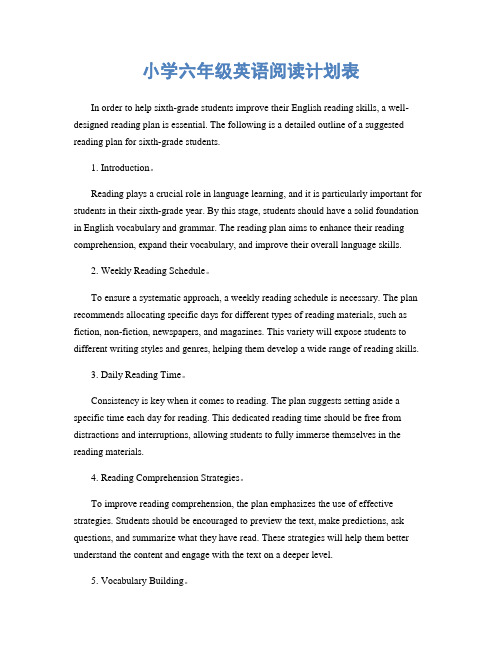
小学六年级英语阅读计划表In order to help sixth-grade students improve their English reading skills, a well-designed reading plan is essential. The following is a detailed outline of a suggested reading plan for sixth-grade students.1. Introduction。
Reading plays a crucial role in language learning, and it is particularly important for students in their sixth-grade year. By this stage, students should have a solid foundation in English vocabulary and grammar. The reading plan aims to enhance their reading comprehension, expand their vocabulary, and improve their overall language skills.2. Weekly Reading Schedule。
To ensure a systematic approach, a weekly reading schedule is necessary. The plan recommends allocating specific days for different types of reading materials, such as fiction, non-fiction, newspapers, and magazines. This variety will expose students to different writing styles and genres, helping them develop a wide range of reading skills.3. Daily Reading Time。
《淮安区小学生英语“广阅读”活动实施方案》
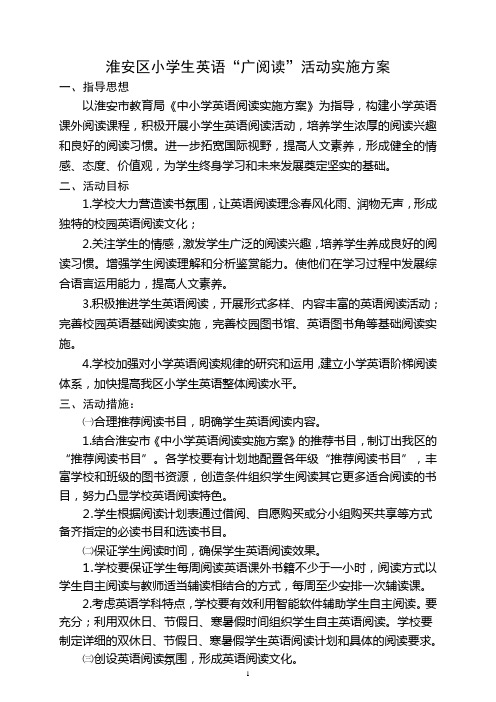
淮安区小学生英语“广阅读”活动实施方案一、指导思想以淮安市教育局《中小学英语阅读实施方案》为指导,构建小学英语课外阅读课程,积极开展小学生英语阅读活动,培养学生浓厚的阅读兴趣和良好的阅读习惯。
进一步拓宽国际视野,提高人文素养,形成健全的情感、态度、价值观,为学生终身学习和未来发展奠定坚实的基础。
二、活动目标1.学校大力营造读书氛围,让英语阅读理念春风化雨、润物无声,形成独特的校园英语阅读文化;2.关注学生的情感,激发学生广泛的阅读兴趣,培养学生养成良好的阅读习惯。
增强学生阅读理解和分析鉴赏能力。
使他们在学习过程中发展综合语言运用能力,提高人文素养。
3.积极推进学生英语阅读,开展形式多样、内容丰富的英语阅读活动;完善校园英语基础阅读实施,完善校园图书馆、英语图书角等基础阅读实施。
4.学校加强对小学英语阅读规律的研究和运用,建立小学英语阶梯阅读体系,加快提高我区小学生英语整体阅读水平。
三、活动措施:㈠合理推荐阅读书目,明确学生英语阅读内容。
1.结合淮安市《中小学英语阅读实施方案》的推荐书目,制订出我区的“推荐阅读书目”。
各学校要有计划地配置各年级“推荐阅读书目”,丰富学校和班级的图书资源,创造条件组织学生阅读其它更多适合阅读的书目,努力凸显学校英语阅读特色。
⒉学生根据阅读计划表通过借阅、自愿购买或分小组购买共享等方式备齐指定的必读书目和选读书目。
㈡保证学生阅读时间,确保学生英语阅读效果。
⒈学校要保证学生每周阅读英语课外书籍不少于一小时,阅读方式以学生自主阅读与教师适当辅读相结合的方式,每周至少安排一次辅读课。
2.考虑英语学科特点,学校要有效利用智能软件辅助学生自主阅读。
要充分;利用双休日、节假日、寒暑假时间组织学生自主英语阅读。
学校要制定详细的双休日、节假日、寒暑假学生英语阅读计划和具体的阅读要求。
㈢创设英语阅读氛围,形成英语阅读文化。
1.学校要根据区小学生英语阅读实施方案,制定学校具体的操作方案。
小学五年级英语制定旅行计划阅读理解

小学五年级英语制定旅行计划阅读理解全文共3篇示例,供读者参考篇1Travel Plan for Fifth Grade StudentsIntroductionTraveling is a great way to explore new places, learn about different cultures, and create unforgettable memories. In this travel plan, we will outline a suggested itinerary for fifth-grade students to visit some of the most popular and educational destinations around the world.Day 1: New York City, USAStart your journey in the Big Apple, New York City. Visit iconic landmarks such as the Statue of Liberty, Empire State Building, Central Park, and Times Square. Explore the Museum of Natural History or take a boat ride to Ellis Island to learn about immigration in the United States.Day 2: London, EnglandNext stop, London! Visit the historic Tower of London, Buckingham Palace, and the British Museum. Take a ride on theLondon Eye for a bird's eye view of the city. Don't forget to see a play in London's famous West End theater district.Day 3: Paris, FranceBonjour Paris! Visit the Eiffel Tower, Louvre Museum, and Notre Dame Cathedral. Enjoy a picnic along the Seine River or take a boat cruise to see the city from a different perspective. Try some delicious French pastries and practice your French with locals.Day 4: Beijing, ChinaContinue your journey to Beijing, the capital of China. Visit the Great Wall, Forbidden City, and Temple of Heaven. Try some authentic Chinese cuisine like dumplings or Peking duck. Take a traditional rickshaw ride through the narrow streets of the Hutongs.Day 5: Sydney, AustraliaFly to the Land Down Under, Sydney! Visit the Sydney Opera House, Bondi Beach, and the Sydney Harbour Bridge. Take a ferry ride to Taronga Zoo to see kangaroos, koalas, and other native Australian animals. Explore the Royal Botanic Garden and enjoy a picnic with a view of the harbor.Day 6: Tokyo, JapanYour final destination is Tokyo, Japan! Visit the bustling Shibuya Crossing, Meiji Shrine, and Tsukiji Fish Market. Try some sushi or ramen at a traditional Japanese restaurant. Visit a Japanese tea house and learn about the art of the tea ceremony.ConclusionThis travel plan is just a starting point for your adventure around the world. As you explore these diverse and exciting destinations, you will learn about different cultures, history, and traditions. Remember to be respectful of local customs and traditions, try new foods, and have fun exploring the world! Safe travels, fifth-grade students!篇2Making a Travel Plan in Fifth GradeAs fifth graders, we are always looking for ways to have fun and learn new things. One exciting project we have been assigned is to create a travel plan to a destination of our choice. This project not only allows us to practice our English skills but also helps us learn about geography, culture, and budgeting. Here is how we plan our dream trip:Destination: JapanWe have chosen Japan as our dream destination because we are fascinated by its rich culture, delicious food, and beautiful landscapes. We are excited to learn more about the history of Japan and experience its unique traditions.Activities:1. Visit Tokyo Disneyland: We want to spend a day at Tokyo Disneyland, trying out thrilling rides and meeting our favorite Disney characters. We also look forward to trying Japanese snacks available at the theme park.2. Explore Kyoto: We plan to visit the historic city of Kyoto and explore its ancient temples, shrines, and beautiful gardens. We are excited to learn about Japan's traditional arts and crafts.3. Relax in Okinawa: After a busy sightseeing schedule, we look forward to relaxing on the beaches of Okinawa. We want to try snorkeling and taste delicious Okinawan dishes.Budget:To make our dream trip a reality, we need to set a budget. We have calculated the costs of airfare, accommodation, meals, transportation, and admission tickets to various attractions. We have also saved some money from our allowances to contribute to our travel fund.Language Skills:During our trip to Japan, we plan to practice our English skills by interacting with locals and reading signs in English. We hope to improve our vocabulary and speaking skills while exploring a new country.Overall, we are excited to create our travel plan to Japan and learn about a new culture. This project has not only helped us improve our English skills but also fostered our curiosity and creativity. We can't wait to present our travel plan to our classmates and inspire them to dream big. Who knows, maybe one day we will turn our dream trip into a reality!篇3Planning a Trip in Fifth GradeAs a fifth-grade student, planning a trip can be both exciting and challenging. There are many things to consider, such as where to go, what to do, and how to get there. In this article, we will discuss how to create a travel plan for a fun and memorable trip.First, decide on a destination. Whether it's a local attraction or a faraway destination, choose a place that interests you. If you enjoy nature, consider visiting a national park or a beach. If youprefer history and culture, explore museums or historical sites. Make a list of potential destinations and research each one to learn more about the attractions and activities available.Next, determine the duration of your trip. Consider how many days you have available and how much time you want to spend at each location. Factor in travel time, sightseeing, and relaxation time. It's important to strike a balance between exploring new places and taking time to relax and recharge.Once you've decided on a destination and duration, create a detailed itinerary. Break down each day of your trip and list the activities you want to do. Include important details such as opening hours, admission prices, and transportation options. Be flexible with your schedule in case you need to make changes due to unforeseen circumstances.Research transportation options and accommodations. Consider how you will travel to your destination, whether by car, plane, or train. If you're flying, compare prices and book tickets in advance to secure the best deals. Look for hotels or rental properties that fit your budget and preferences. Check reviews and ratings to ensure you have a comfortable stay.Pack wisely for your trip. Make a list of essential items you will need, such as clothing, toiletries, and travel documents.Check the weather forecast for your destination and pack accordingly. Don't forget to bring any medications or personal items you may need. Travel light to avoid lugging around heavy luggage.During your trip, make the most of your time by exploring the sights and trying new activities. Take photos to capture memorable moments and create lasting memories. Immerse yourself in the local culture by trying new foods, learning about the history, and interacting with the locals. Be open to new experiences and embrace the adventure of travel.In conclusion, planning a trip in fifth grade can be a fun and rewarding experience. By choosing a destination, creating an itinerary, researching transportation and accommodations, packing wisely, and immersing yourself in the local culture, you can have a memorable and enjoyable trip. So start planning your next adventure and make the most of your travel experiences. Happy travels!。
小学生英语学习计划_小学生英语学习计划范文

小学生英语学习计划_小学生英语学习计划范文
在现如今全球化的社会中,掌握英语不仅是一项重要的技能,也是未来成功的关键之一。
因此,为了让孩子更好地掌握英语,我们需要制定一套科学、全面的小学生英语学习
计划。
1. 制定学习目标
首先,制定学习目标是非常重要的一步,这样可以让孩子明确自己的学习方向,知道
自己每天需要学习的英语内容。
学习目标应当具有可实现性、明确性和具体性。
例如,孩
子可以设定每周背诵50个单词的目标或每天用英语和父母进行一次2分钟的对话。
以日为单位制定学习计划。
每天的计划应当充分利用孩子的学习时间,包括听、说、读、写四个方面。
家长可以安排电视节目、英语歌曲、口语练习等活动,帮助孩子在愉快
中学习。
3. 积极参与课堂
老师提供的资源和指导对于孩子的学习至关重要,因此鼓励孩子积极参与课堂活动,
回答老师的问题、与同学互动合作,都能够加强孩子的英语学习。
4. 多媒体学习
孩子们可以通过多媒体学习,如:听英语歌曲、看英语卡通片以及玩英语单词游戏等,更加轻松愉快地掌握英语知识。
有些英语学习软件,大多数小学生都能通过它们演练口语、阅读和写作,从而提高英语水平。
5. 培养阅读习惯
阅读是提高英语水平的重要途径之一。
放下手机,好好读书。
家长可以提供一些合适
的英语读物供孩子阅读,帮助孩子扩大词汇量,提高阅读理解能力,从而提高写作水平。
以上就是小学生英语学习计划的一些建议,如果家长能够配合老师,帮助孩子建立起
科学的英语学习习惯,孩子们必然会获得更好的英语学习成效。
- 1、下载文档前请自行甄别文档内容的完整性,平台不提供额外的编辑、内容补充、找答案等附加服务。
- 2、"仅部分预览"的文档,不可在线预览部分如存在完整性等问题,可反馈申请退款(可完整预览的文档不适用该条件!)。
- 3、如文档侵犯您的权益,请联系客服反馈,我们会尽快为您处理(人工客服工作时间:9:00-18:30)。
2016-2017学年度第一学期英语阅读计划
一、指导思想:
培养小学生英语阅读能力是英语教学目的之一,对于小学英语教学来说,首先要培养的是学生的听、说能力,当学生有了一定的听、说基础之后,就需要不失时机地加强阅读教学。
因为英语学习需要不断地复现,需要大量的输入来强化听、说的语言材料并加以拓展。
简单机械的复现和输入会使学生失去学习的兴趣,只有将所学的知识放到新的情景中,放到新的阅读活动中才能吸引学生,使学生保持持久的学习兴趣。
通过英语课外阅读,不断丰富学生的阅历,开拓学生的文化视野,体验学习英语的乐趣,树立学好英语的自信心,实现学习英语的真正意义和价值,为未来的学习奠定坚实的基础。
二、阅读目的:
1、根据学生的年龄特点,定期开展课外阅读,在老师的带领下让学生进行快乐英语阅读,逐步培养学生良好的英语阅读习惯。
2、扩大学生的词汇量。
通过阅读,让学生掌握更多的词汇。
3、介绍英美文化背景,帮助学生理解不同文化背景下的习惯用语并增加学习兴趣,拓宽眼界,增长知识。
4、增加学生口语锻炼的机会。
通过学生理解故事、跟读、师生对话、学生相互情景对话的方式增加学生的口语锻炼。
三、阅读材料:
根据各年级学生不同年龄特点,安排相应难易度的阅读,主要将利用短小的英语故事绘本,老师带领学生一起阅读。
四、阅读时间安排:
本英语阅读活动以月为单位展开,每月阅读一本书,利用英语阅读课阅读,每月共四次,并在月末安排一节阅读课,对本月的阅读进行回顾复习和展示。
课时安排:
五、阅读活动落实与回收
1、召开主题教研会议,周知各年级段阅读内容,共同探讨英语阅读教学流程。
2、由于刚开始开展英语阅读活动,过程中肯定会出现一定的疑难问题,但各老师要严
格执行每月的英语阅读时间安排,不得占用或不利用,老师在每次课后总结自己在阅读课上的经验和不足,教研主任将在英语阅读时间巡堂,总汇各老师阅读课情况,所有老师及时地在教研会议上进行经验分享和解决疑惑。
3、本学期每个年级将完成四本英语故事的共性阅读,将在学期末的时候统一检测,每个年级评出一个最佳英语阅读之星。
英语教研组
2016-2017学年英语阅读计划。
